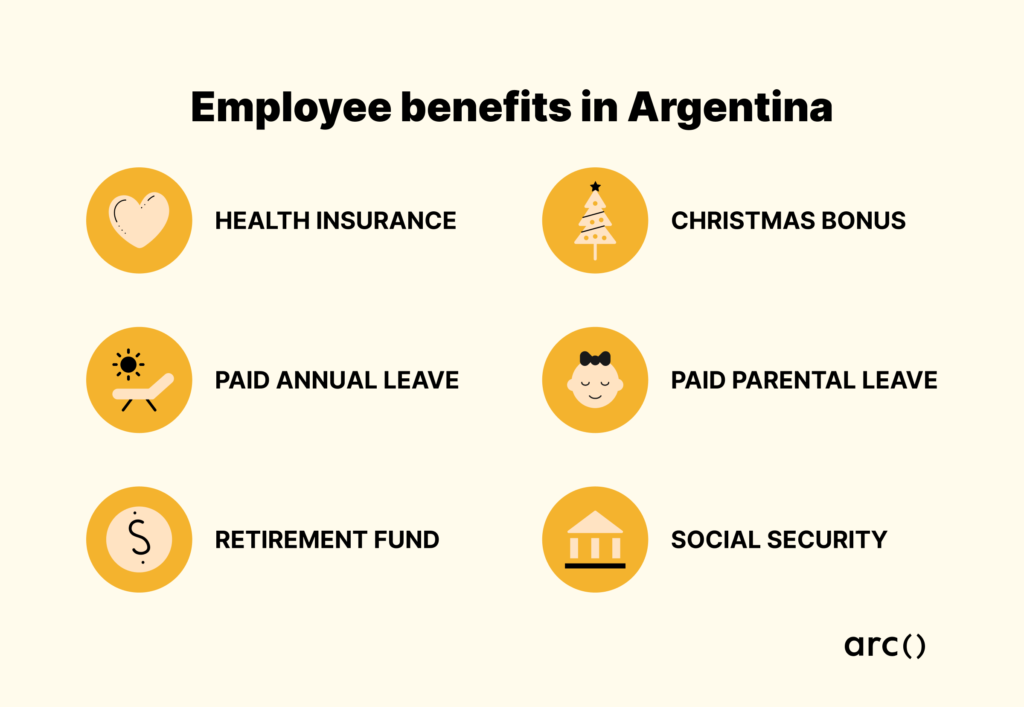Want to tap into a highly skilled and educated workforce? Hiring employees in Argentina offers that and more. With lower labor costs and convenient time zone overlaps with North America, Argentina is a prime location for expanding your team.
But there’s a catch: Argentina’s complex labor laws. To hire successfully, you need to understand the country’s detailed regulations on employee benefits, compensation, termination, payroll taxes, social security, annual leave, overtime pay, and union rights.
Despite these challenges, Argentina’s strong worker protection laws ensure a fair and stable work environment. The benefits of hiring here include:
- Highly educated, skilled talent pool
- Lower labor costs compared to other Latin American countries
- Time zone overlaps with North American time zones
- Access to modern infrastructure and technology
Argentina’s unique culture, rich in traditional family, loyalty, and community values, influences workplace norms and expectations. Understanding these cultural aspects, along with the legal landscape, is key to developing an effective hiring strategy.
This blog post will guide you through Argentina’s legal and cultural landscape, helping you build local expertise and networks. By the end, you’ll be ready to navigate labor regulations and access Argentina’s top talent pool with ease.
Looking for top talent fast? See how Arc can help you:
⚡️ Find developers, designers, marketers, and more
⚡️ Freelance or full-time remote + fully vetted
⚡️ Save up to 80% with global hires
Hire top talent with Arc risk-free →
Hiring Employees in Argentina
One of the largest countries in South America, Argentina has a highly educated, skilled workforce. An extensive understanding of its job market and recruiting channels can help you simplify and streamline your hiring process.
Online remote job sites most popular among Argentine job seekers include Bumeran, ZonaJobs, and Computrabajo. Professionals also use LinkedIn widely, especially when searching for long-term roles. However, the quality of candidates on these platforms might not be the best.
Platforms like Arc can also help you quickly and easily find top talent in Argentina.
Create a Hiring Plan Specific to Argentina
Once you know you need to hire employees in Argentina, first create a special hiring plan for Argentina to find great workers even when hiring is tough.
When posting jobs, keep your required qualifications aligned with the standard requirements for Argentine employees. Some of the most in-demand skills include:
- Fluency in Spanish and English
- Digital literacy and technical skills
- Leadership abilities
- Customer service and communication skills
To attract top talent, advertise open positions across multiple platforms and emphasize your company’s strengths, such as career development opportunities, competitive pay, and benefits.
Once you find the right candidate, hire them quickly — The best candidates are always in high demand. To accelerate your hiring process further, try using employee referrals and professional networks alongside job postings.
Want to learn more about hiring employees in Argentina? Tune into this video by Remote, uncovering myths, unexpected benefits, unique laws, and everything else you need to know.
Argentine Employment Contracts
Employment contracts are mandatory and highly regulated in Argentina, and each contract must contain:
- Employer and employee names
- Employment start date
- Job description and responsibilities
- Work location
- Compensation and benefits details
- Working hours and vacation time
- Contract term (fixed or permanent)
- Probation period clause
- Notice period for termination
- Severance pay provision
Currently, Argentine labor law recognizes two types of employment contracts.
- Fixed-Term Contracts: Also called temporary contracts, these can be used only for specific jobs involving seasonal work and project-based tasks. The maximum length for a fixed-term contract is one year, with the possibility of one extension of up to six months. If you don’t intend to extend the contract, you must provide a 20-day notice to independent contractors.
- Permanent Contracts: These don’t have an end date and may be terminated only when both the employer and employee agree. They may also be terminated when the employee quits, retires, or is fired for a just cause or when the employer decides to terminate the contract for any reason and pays severance.
Employees on a permanent contract also have greater job stability than those on fixed-term ones. They also have access to benefits like severance pay.
Probation Periods
In Argentina, it’s common practice to include a probation period clause in employment contracts. The standard probationary period for regular staff is three months, during which either party can terminate the contract with a 15-day notice for a just cause or appropriate severance pay.
The probationary period can be shorter if agreed upon in the contract. However, it can never be longer than three months.
Compensation and Benefits for Employees in Argentina
Argentina employment laws regarding compensation and benefits are comprehensive, and they cover minimum wage, mandatory benefits, and additional compensation:

Minimum Wage
The Argentinian government periodically updates its national minimum required wage. As of August 2024, it was Argentine Peso (ARS) $262,432.93 per month for full-time employees, which equaled around USD $281.63 per month.
Minimum wage requirements apply to all employees, including youth and foreign employees, even during training periods. In many industries and sectors in Argentina, the minimum salary payment can exceed the national level due to union negotiations.
Leave Policy
Employers must provide employees with at least 14 annual paid time off days per year.
Argentinian employees are eligible for up to three months of paid sick leave annually if they’ve worked for less than five years and at least six months of sick leave per year if they’ve worked for five or more years. They can also request for unpaid sick leave for an additional 12 months.
Pregnant female employees are entitled to up to three months of paid maternity leave, with optional extended leave of up to six months. Expecting male employees, on the other hand, are entitled to only two days of paid paternity leave.
Argentine labor law, however, has no childcare or parental leave provisions.
Public Holidays
Argentina follows 15 official public holidays (most of which are also followed in many countries in Latin America):
- New Year’s Day — January 1
- Carnival — Monday and Tuesday before Ash Wednesday in February
- Truth and Justice Memorial Day — March 24
- Good Friday — March 29
- Malvinas Day (or Veterans Day) — April 2
- International Workers Day — May 1
- May Day Revolution Day (or Bridge Day) — May 25
- Martín Miguel de Güemes Day — June 17
- Flag Day — June 20
- Independence Day — July 9
- San Martin’s Day — Third Monday in August
- Day of Respect for Cultural Diversity — October 14
- National Sovereignty Day — November 18
- Immaculate Conception — December 8
- Christmas — December 25
Argentina employees who work these days are compensated with double their wage for that day. If the holiday falls on the weekend, it is moved to the following Monday.
Bonuses and Other Contributions
All employees in Argentina receive a mandatory Christmas bonus (aguinaldo) equal to one month’s salary, paid out in two installments.
You and the employee must contribute to the employee’s social security, pension, labor risk insurance, and health insurance funds at around 28% of the salary.
Employee’s Salary
Employers pay 13 monthly salaries per year. Most employers often display the potential salary on job posts as a monthly gross amount.
For entry-level professionals, monthly salaries in Buenos Aires can range from ARS $80,000 (USD $450) to ARS $150,000 (USD $850), while they can start around ARS $200,000 (USD $1,150) for management and executive roles. Salaries for engineering, tech, and finance roles tend to be on an even higher side.
You can also try Arc, your shortcut to the world’s best remote talent:
⚡️ Access 450,000 top developers, designers, and marketers
⚡️ Vetted and ready to interview
⚡️ Freelance or full-time
Try Arc and hire top talent now →
Payroll, Taxes, and Compliance for Employers in Argentina
Payroll management and labor regulation compliance in Argentina can be complex for global employers. This section lists some critical payroll, tax, and compliance considerations for Argentina.
Individual Income Tax
In Argentina, both residents and nonresidents are subject to progressive income tax rates, ranging from 5% to 35%.
Here’s a detailed breakdown:
Payroll Costs and Labor Taxes
Knowing the total payroll costs is essential for planning your hiring budget. Be ready for other payroll costs in Argentina, which can incur 30%–35% of the employee’s salary. These costs can include not only employer contributions for social security contributions, healthcare, and other mandatory employee benefits but also monthly income tax and union due withholdings.
Regulation Compliance
Paying close attention to and being compliant with regulations can help you avoid unnecessary penalties. Many Argentine labor laws and regulations are related to pay frequency, payment methods, pay slips, record keeping, etc. For example, pay frequency will depend on your employee’s worker classification. Also, all employers are required to document compensation on pay slips.
Payroll Providers
Many companies choose to work with local payroll processing providers in Argentina. These providers handle monthly payments, tax filings, and compliance obligations on the companies’ behalf. This reduces your risks and administrative burdens, especially if you run a small company or don’t have a legal entity in Argentina.
Compare providers to find one that suits the employer’s needs.
Staying on top of Argentina’s complex payroll and tax obligations, as well as its legal changes and requirements, takes diligence and expert support. By including knowledgeable in-house staff or external providers in your hiring and payroll teams, you can ensure full compliance throughout the terms of employment contracts.
Cost Savings of Hiring from Argentina
You save big when hiring talent from Argentina. On average, U.S.-based freelance developers charge $110-$150 per hour, while Argentine developers only charge $60-$90 per hour. That’s up to 60% in savings when hiring freelancers from Argentina. For full-time salary comparisons, you’ll also find significant savings. Check out our comparison of remote developer salaries in Argentina compared to salaries in the US for details.
For other roles, the savings are similar when hiring talent from Argentina. In the U.S., freelance designers and marketers charge $70-$135 per hour. In Argentina, these professionals charge just $40-$70 per hour. This means you can get the same high-quality work for almost half the price. These savings are significant, especially for startups and small businesses looking to maximize their budget without compromising on quality.
Companies are increasingly looking to Argentina for talent. The cost savings allow you to invest in more resources, expand your team, or improve other areas of your business. You get top-notch quality for a fraction of the price, making Argentina a smart choice for cost-effective, high-quality talent.
Work Permits and Visas for Employment in Argentina
Companies hiring foreign employees in Argentina must be aware of the country’s work permit and visa requirements.
Work Permit
To hire a foreign national residing in Argentina, you’ll need to help the potential employee apply for a temporary resident visa and work permit to legally work there. However, you’ll need to establish a local legal entity in Argentina first.
Next, you’ll have to file a work permit application with the Immigration Office specifying the foreign worker’s role, qualifications, and salary. This application will include the employment contract, corporate documents, and an explanation for hiring a foreigner over local talent.
If your application is approved, the Immigration Office will issue a work permit valid for one to three years, depending on the contract duration.
All foreign nationals in Argentina are required to renew their work permits before they expire. They can also get a temporary resident visa with a work permit from an Argentine consulate in their home country.
You can also renew your employee’s visa and work permit annually for up to 3 years, after which they may be eligible for permanent residency in Argentina.
Dependent Visas
You can include your employee’s spouses and children under 18 as dependents in the visa and work permit application. If approved, they’ll also be eligible for temporary resident visas.
Challenges and Alternatives
The work permit application process can take two to three months — but it may be delayed further in certain circumstances. Also, foreign workers of some nationalities may have restrictions on specific professions and quotas on work permits. You may consult an immigration lawyer to navigate these challenges.
On the contrary, some employee categories, like technical specialists, professionals, and intra-company transfers, may qualify for a faster, more simplified work permit application process.
So, evaluate all available options to identify the most optimal work permit application strategy for your situation.
Managing Remote Teams
Remote work has become extremely common in Argentina, especially after the COVID-19 pandemic. While it allows for great flexibility, hiring employees in Argentina comes with some important legal and cultural considerations.
Laws Around Remote Work
In 2020, Argentina passed legislation — called the Teleworking Law — formally recognizing remote work. Here are some of its important stipulations:
- Companies must establish remote work policies covering working hours, productivity tracking, and data privacy.
- Companies must provide equipment like laptops and reimbursement for internet use.
- Employees may disconnect outside of the agreed-upon work hours.
Remote Worker Management Tools
With the right tools, you and your employees — both remote and in the office — can enjoy smooth, time-efficient working conditions. Here are some great examples:
- Project management software like Asana or Trello can help your remote staff coordinate tasks and workflows.
- Communication tools like Slack and Zoom can help your teams scattered across the globe align via instant messaging and video calling.
- With time tracking tools (e.g., Time Doctor) and productivity trackers, your employees can manage their remote worker output.
While many of these tools will allow you to easily access your remote employees’ work, try to avoid using them for micromanaging.
Engaging and Motivating Your Remote Team
The absence of in-person contact can impede your attempts to build relationships with your remote staff.
To promote social interaction, schedule some virtual coffee breaks and team activities. Engage your remote workers by publicly recognizing their achievements and giving them autonomy.
Always be flexible to the local needs of your employees, like family obligations or school schedules, to improve motivation and loyalty among your remote teams.
You can also try Arc, your shortcut to the world’s best remote talent:
⚡️ Access 450,000 top developers, designers, and marketers
⚡️ Vetted and ready to interview
⚡️ Freelance or full-time
Try Arc and hire top talent now →
Cultural Nuances in Argentine Workplaces
Argentina’s rich cultural heritage influences the norms and expectations at most workplaces. Understanding these cultural nuances is key to building an inclusive environment and effectively leading cross-cultural teams.
Fostering Diversity and Inclusion
Discrimination based on sex, gender, ethnicity, religion, or orientation is illegal in Argentina. So, it’s important that all your remote jobs in Argentina are hired under equal-opportunity considerations, with diversity evident at all levels.
Other essential recommendations or considerations include the following:
- Do not tolerate harassment.
- Implement anonymous reporting channels.
- Take complaints seriously, and investigate promptly.
- Accommodate unique needs.
- Be flexible with religious observances, cultural traditions, and family responsibilities.
Termination and Severance Terms in Argentina
Terminating employment relationships in Argentina is a complex process, governed by strict labor laws. To avoid potential lawsuits, you must abide by specific procedures for all individual or mass terminations.
Notice Period
Argentine law requires advance written notice before employee termination without cause. The notice period will depend on the employee’s service term:
- 15 days for employees under probation
- 1 month for those with an employment period of less than 5 years
- 2 months for those with an employment period of 5 or more years
During the notice period, the employee will continue working while receiving full pay and benefits.
To skip the notice period and terminate the employment contract immediately, you may opt to compensate the employee with an appropriate payment.
Severance Pay
Regardless of the reason for termination, you’ll be required to provide severance to employees based on their employment period:
- 1 month’s salary per service year for those employed for less than 5 years
- 2 months’ salary per service year for those employed for 5 or more years
The monthly salary rate will be the employee’s highest average monthly compensation in the previous year. The maximum severance payout is capped based on seniority.
Layoffs
If you plan to lay off more than 15% of your staff, you must give authorities and union representatives at least two to four months’ notice. If you fail to do so, you must pay double the required severance to the affected employees.
Layoffs based on discrimination, backlash, or other unjustified reasons can lead to lawsuits and penalties. When planning staff restructuring or downsizing, seek experienced legal counsel if possible.
Using Employer of Record Services in Argentina
Employer of Record (EOR) providers offer companies an alternative for hiring in Argentina without establishing a local entity.
With their local legal entities, EORs handle your employees’ compliance, payroll, benefits, and more. As a result, you only need to manage your remote employees’ day-to-day work.
Many companies use EORs for hiring in Argentina before transitioning to their local entity there. This allows them to begin operations quickly while building up a local office and other infrastructure over time. And, when the time comes to incorporate locally, EORs can offer transition support.
A few of the top EOR providers operating in Argentina are preferred Arc Partners.
Make sure that the EOR provider you choose knows your work, has good reviews, can work anywhere, and understands employment law and regulations in Argentina. Also, ensure that you clearly understand the EOR provider’s costs, compliance guarantees, and service levels before signing on.
Want to find top talent from Argentina? Arc has you covered with amazing developers, marketers, and designers.
Looking for top talent fast? See how Arc can help you:
⚡️ Find developers, designers, marketers, and more
⚡️ Freelance or full-time remote + fully vetted
⚡️ Save up to 80% with global hires








